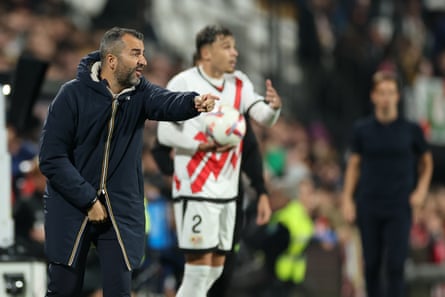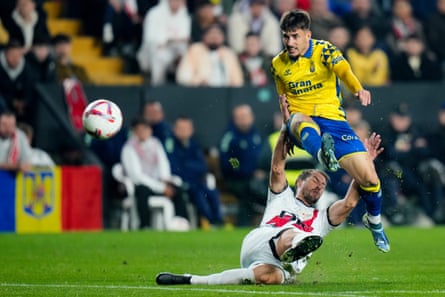Diego Martínez and his players made a pact not to look at the table but this time, as they headed along the cramped passageway, down the stairs, out the little red door and on to the big yellow bus, carrying Telepizzas and turning on phones, they could be forgiven for taking a sneaky peek. They had just beaten Rayo Vallecano 3-1 and, for the first time since August, were not in the relegation zone. It was three minutes after midnight on Friday when they pulled out of Fofo the Clown Street and turned left towards the hotel, another long flight home awaiting the following morning. They were probably still wondering how it had happened, how any of it had, but UD Las Palmas travelled in hope again.
When the bus departed, one player wasn’t on board. Manu Fuster’s mother has been feeding flood victims at her restaurant in Quart de Poblet; now his brother was waiting for him in the car outside, ready to take him home. With a lovely flick of his right foot, he had scored the third, having only been on the pitch two minutes. “It was very special for everything that’s happened, because it’s my first in primera, because it helped us win,” he said before setting off straight for Valencia. “If you’d said we’d be in this position this a month back, we’d have put our heads in our hands. No one bet a duro, five pesetas, on us but things have changed completely.”
A month ago to the night, Las Palmas had sacked coach Luis Carrión; the next day, they replaced him with Martínez. They were bottom, the only team without a win in nine weeks, and had only three points, even if one of those was against Real Madrid. It was worse than that too, the collapse running way back into last season. On 10 February, Las Palmas had beaten Valencia 2-0. With two thirds of the 2023-24 season gone, and only two La Liga teams having more of the ball than them, the recently-promoted side were just three points off a European place and playing some of the best football in Spain. They didn’t win again.
Safe so early they almost ended up not being safe at all, sleepwalking their way towards segunda and finally clinching survival with a 0-0 draw at Cádiz on the penultimate weekend, Las Palmas went 14 games without a win under Xavi García Pimienta. And then they went another nine this season, slipping to the bottom under Carrion. So Martínez took over and 23 matches, eight months and no wins turned into four matches and three wins in one month. Plus another in the Copa del Rey, 7-0 against Ontiñena. A goal down inside 14 minutes, they beat Valencia at Mestalla – a “liberation”, the new coach called it – defeated Girona, lost away at Atlético, and now won at Rayo, the relegation zone left behind at last.
“We’ve found the switch, you see it in these games we have won,” goalkeeper Jasper Cillessen said. “No one thought we were alive; everyone gave us up for dead,” Fuster added. “Diego gathered us into a circle and told us the energy in here was going to do it for us, because we had the ability.” In the four games since Martínez has been in charge, no one in La Liga has more points. The coach, wrote La Provincia, is “the puto amo”, “UD’s Napoleon,” the man who “changed the model and their fate”, the team going “from a flan to a hammer … leaving behind its ghosts and its agony, now able to fight for survival that no longer looks like a utopia.”
 View image in fullscreen
View image in fullscreen
Las Palmas had needed this. Martínez had not immediately been sure that he did, but the club insisted, listened, took their time. They finally announced his arrival at the start of the October international break which allowed him to build, and it has been good for him too.
When he was little, growing up in Vigo, Martínez’s aunt ran a press kiosk. He spent hours there surrounded by football stickers, all those Don Balon magazines to himself. He was obsessive – quizzes with his staff fill travel hours – and drawn to the details. He became a ballboy at Celta, who he joined at nine. Although he never made it beyond the third division as a player and claims he was never likely to either, lacking the ability to go with the analytical mind, he went to study sports science at Granada University. Martínez got his first coaching job in tercera at 25 and, signed by Monchi, who had seen something in him, joined Sevilla, where he worked as C-team, B-team and youth-team coach as well as assistant to Unai Emery, before setting off alone.
Charismatic and energetic, demanding, every detail mattering, fond of taking lessons from other sports and lines from other sportspeople, Martínez was a revelation at Granada. Arriving aged 37, he took them up to the first division and straight into Europe. They went all the way to the quarter-finals where they met Manchester United and he was going all the way to the top, it seemed. The coach of a new generation, a legacy was left at Los Carmenes that others simply could not follow, the club relegated twice in two first-division seasons since his depature. It was a given that he would be at Sevilla soon – a rumour he thought harmed him – but instead he took a sabbatical in England, itself an indication of his ambition. And yet when he returned it was for just under a year at Espanyol, which felt a little underwhelming. Then there was a short spell at Olympiacos. When he arrived at Las Palmas, he hadn’t coached for a year; the team he was taking on were the worst in Spain, closing in on the worst run ever.
 View image in fullscreen
View image in fullscreen
“Coaches are not Nadal or Federer”, he said, they have “no magic wand” and if he was here, he said, that was because “things are not good.” “Everyone sees us as candidates for relegation,” he admitted. Candidates? Most saw them as a certainty, the situation desperate. There was, though, something there: a challenge, identifiable changes that could be made. Small ones, perhaps, but a lot of them. Above all, he was convinced there was the most important ingredient: talent. The rest could be taught, demanded. Under García Pimienta and Carrion, they had begun a spiral downwards, falling apart at the smallest thing.
“Players are not washing machines that you can plug in anywhere and they work just the same,” Martínez said. “There are moments. We need work, optimism and an ability to manage frustration because it’s going to be a hard path, but from the worst moments you can take lovely ones.” And so they began, one day and one detail at a time. On an island where life is good, sometimes too good, that’s not always easy; with a team built to have the ball, to play, it’s not so easy either. But here they are: more direct, more defensive, more resilient, more competitive, concentrated. After Friday’s win, there was something telling in how the coach insisted: “The players and all the staff deserve this. I know what I am talking about because I see them work every day at Barranco Seco; the people who are there will understand me.”
“The sessions are long, different, there’s another methodology,” defender Álex Muñoz explained. “We’re adding tactical concepts that maybe we weren’t looking after before. That’s what we need right now: those demands, that intensity.”
skip past newsletter promotionSign up to Football Daily
Kick off your evenings with the Guardian's take on the world of football
after newsletter promotion
La Liga results
ShowRayo Vallecano 1-3 Las Palmas, Real Madrid 4-0 Osasuna, Villarreal 3-0 Alavés, Leganes 1-0 Sevilla, Real Betis 2-2 Celta Vigo, Mallorca 0-1 Atlético Madrid, Getafe 0-1 Girona, Valladolid 1-1 Athletic Club, Real Sociedad 1-0 Barcelona
Wins too, and a little luck. “Big doses of luck,” as one local paper admitted: flowers, as they put it in Spain, and the flowers were welcome too. “Sport is capricious, sometimes you need an emotional spike to change everything, a click, three points which make the team feel strong and, suddenly, everything changes,” Martínez had said when he took over. Against Valencia, Las Palmas got it. Then came Girona. And now Rayo. They had been different games – “if you go up the Sierra Nevada, you don’t go in swimming trunks, you go in ski gear; if you go to Las Canteras [beach], you do” Martínez said afterwards. It wasn’t always easy to explain; this win certainly wasn’t, Rayo midfielder Gerard Gumbau shrugging and saying “that’s football.”
Gumbau’s team had taken 34 shots and only scored one – and that was a last-minute Scott McKenna own goal with the game already lost. Las Palmas had three on target, and won 3-1. One came from a corner – for the first time since April. The end result though, was the same, nine points from 12 lifting Las Palmas from the relegation zone, changing everything. Besides, Martínez insisted: “the harder we work, the luckier we get.”
“Nine points from 12 with three away games is very positive,” Martínez said. “I’d love there to be a simple explanation but it’s not one thing you say to them; it’s their ability to believe. It’s all those one percents, the little things. We listened a lot, we were honest with them, we believed in them. We’re a team with ability that maybe now makes the most of other facets, that believes there are other ways of scoring goals and isn’t self-destructive when it goes against us. We have improved physically and tactically. There were things we did not do well; we’re better balanced now. The effort they have made is titanic; we have pushed them to the limit this month. There is still a lot, a lot, a lot, a lot to do but I’m proud of them.”
The feeling is mutual. Outside, the bus was waiting, so too a car. “Diego was the first madman to believe in us,” Fuster said as Las Palmas’s players left Vallecas with another victory, the table they weren’t supposed to look at telling a tale of revival, a little hope let in at last.
Comments on this piece will open later
| Pos | Team | P | GD | Pts |
|---|---|---|---|---|
| 1 | Barcelona | 13 | 28 | 33 |
| 2 | Real Madrid | 12 | 14 | 27 |
| 3 | Atletico Madrid | 13 | 12 | 26 |
| 4 | Villarreal | 12 | 4 | 24 |
| 5 | Osasuna | 13 | -3 | 21 |
| 6 | Athletic Bilbao | 13 | 6 | 20 |
| 7 | Real Betis | 13 | 2 | 20 |
| 8 | Real Sociedad | 13 | 1 | 18 |
| 9 | Mallorca | 13 | 0 | 18 |
| 10 | Girona | 13 | -1 | 18 |
| 11 | Celta Vigo | 13 | -2 | 17 |
| 12 | Rayo Vallecano | 12 | 0 | 16 |
| 13 | Sevilla | 13 | -6 | 15 |
| 14 | Leganes | 13 | -3 | 14 |
| 15 | Alaves | 13 | -8 | 13 |
| 16 | Las Palmas | 13 | -6 | 12 |
| 17 | Getafe | 13 | -3 | 10 |
| 18 | Espanyol | 12 | -11 | 10 |
| 19 | Valladolid | 13 | -15 | 9 |
| 20 | Valencia | 11 | -9 | 7 |
